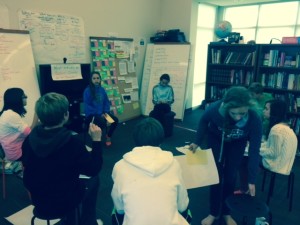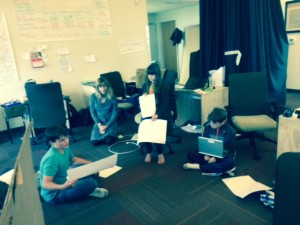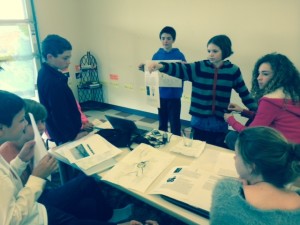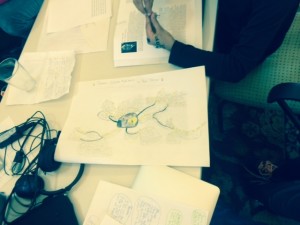What do Guides at Acton Academy actually do, if we never teach or respond to questions?
The answer – we’re Game Makers. We describe an exciting end goal, design the incentives, suggest a few boundaries or rules, provide a list of tools and process — and then get out of the way. Our goal is to inspire Eagles to pack as much learning into the day as possible.
Take for example, this session’s Creator Speech Quest. First, each Eagle chooses a Scientific Explorer of Ideas (a paradigm buster); Innovator or Inventor. Five weeks from now, at the public exhibition, each will deliver an original four minute “hero’s journey” speech from the shoes of their Creator and unveil a Rube Goldberg device that celebrates the scientific contributions of their hero.
Here’s the catch – a maximum of eight Creators per category will be allowed to speak. So who determines which Eagle qualifies for which spot? The Eagles themselves.
1. First, all Eagles in a category deliver a two minute pitch displaying their research and mind map, asking to be “green lighted” (approved.) Everyone in the group rates each pitch and provides warm and cool critiques.
2. The top rated 2/3 of the group (a maximum of five) are elected to be the Excellence Committee for that group. The Excellence Committee decides whether those receiving a lower rating should be admitted immediately (up to a maximum of eight) or asked to do more research and polishing and then pitch again.
3. What keeps the Excellence Committee from quickly approving more members and filling the group? The final ratings, from customers at the exhibition, will be based on the average rating per person. So you do not want any slackers on the team to bring down your average score.
Today was pitch day. Nine Eagles pitched for Inventors; nine for Innovators; three for Creators. Five were admitted to the first and second groups; two to the third group. Standards were high. Many Eagles were asked to do additional work and pitch again.
The result:
1. A high level of energy and enthusiasm, because each Eagle chose a hero who appealed to his or her calling.
2. Standards were set by Eagles and kept high. If you hadn’t turned in first rate work, there was no shame, but you got the chance to try again. Plus you received a great deal of encouragement and coaching.
3. Along the way, there was much work and learning around the processes for research, mind mapping, pitching and how to compete for scarce resources – all with an eye toward rigor.
4. Eagles learned a lot about the lives of twenty four different scientific heroes, and what motivated them.
Examples of the criteria Eagles developed to judge “productive research:”
- Quality and credibility of sources;
- Number and variety of sources;
- At least one serious biography selected.
- Facts; opinions and stories.
- Clearly organized and present with enthusiasm.
- Tells a Hero’s Story.
Some of the questions asked during grilling:
- How much time will you be able to work on this? What will you sacrifice to make room for this effort?
- What progress have you made so far on your Rube Goldberg device?
- How will your Rube Goldberg device reflect your hero’s contributions?
- Are you going to spend more time or less time and effort on this project than you did on the rocket project? Do you promise?
- Will you spend more time and effort on your hero’s speech or your Rube Goldberg device?
- How much research have you done and how much more will you promise to do?
Self organizing learning; making research fun; adding a competitive edge to encourage rigor and excellence – not a bad day’s work for a Guide, especially since we didn’t do much at all.



